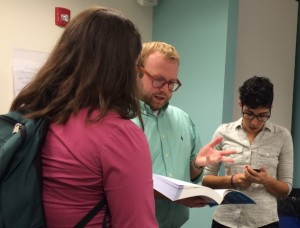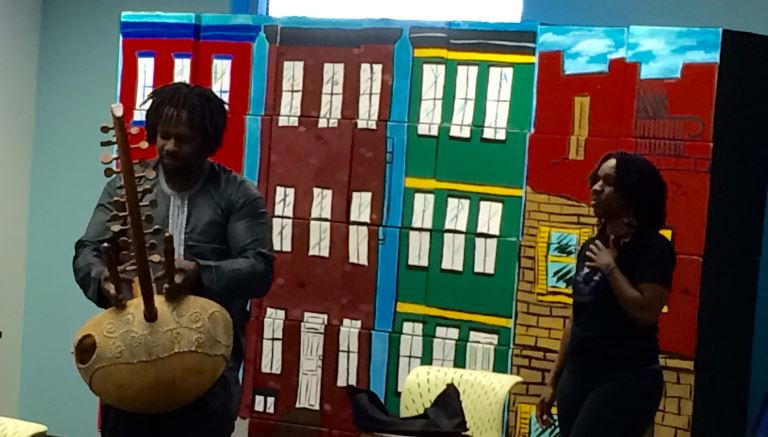This month, the Thriving Communities Collaborative (TCC) continued our focus on healing and building strong communities. The presentations given by Nneka Nnamdi of The Living Well and David Klark and Renee Angelo of The Choice Program at UMBC outlined strategies for helping communities deal with and mitigate the effects of trauma and toxic stress. At the core of these presentations was the idea that sometimes people undergo experiences that may not be able to be healed with traditional therapies or medication – where treatments like music, dance, Yoga, relationships, and love form the basis for healing.
Nneka kicked off the meeting with her presentation, Movement is Medicine, accompanied by Amadou Kouyate. Nneka began by getting the audience to experience first-hand how we can set the tone with music, contrasting a relaxing, peaceful piece with something more upbeat and motivating. From there we moved on to dance, examining how we felt after participating in each experience. In just a few seconds, through music and dance, we were able to personally experience shifts in our mental and physical states. This set the foundation for Nneka’s discussion stressing how important the arts can be in promoting healing. She drew from her own personal experience and the global community. Nneka and Amadou also stressed how important it was to leverage the cultural traditions of the specific community, for example leveraging urban teenagers’ predisposition toward rap music.
Her presentation reminded me of the messaging we had recently been exposed to via a training session from Dr. Bessel van der Kolk – The Body Keeps the Score. Dr. van der Kolk, a renowned psychiatrist, known for his work with post-traumatic stress, highlighted the importance and effectiveness of non-traditional therapies like Yoga in the treatment of Post-Traumatic Stress Disorder. In fact, he cited multiple studies where it has been proven more effective that Cognitive Behavioral Therapy and Drug Therapy…yet, in most instances, our healthcare system doesn’t recognize Yoga (or dance for that matter) as reimbursable treatments. This pointed out the importance of rethinking how we think about treatment and care.
 David Klock and Renee Angelo followed with a discussion about how The Choice Program focuses on building protective factors and resilience with at risk teens. The program relies on college graduates from diverse backgrounds who are hired to serve in a one-year position as Community Service Learning Fellows. The Learning Fellows leverage Dr. Ken Ginsberg’s model to help build resilience in troubled teens relying on the seven C’s which Ginsberg sets forth as the building blocks of resilience: competence, confidence, character, connection, contribution, coping and control. At the core of program is the development of a relationship between the Learning Fellow and the youth through daily in-home visits, a focus on the youth’s strengths, and the establishment of community connections that help to build on those strengths.
David Klock and Renee Angelo followed with a discussion about how The Choice Program focuses on building protective factors and resilience with at risk teens. The program relies on college graduates from diverse backgrounds who are hired to serve in a one-year position as Community Service Learning Fellows. The Learning Fellows leverage Dr. Ken Ginsberg’s model to help build resilience in troubled teens relying on the seven C’s which Ginsberg sets forth as the building blocks of resilience: competence, confidence, character, connection, contribution, coping and control. At the core of program is the development of a relationship between the Learning Fellow and the youth through daily in-home visits, a focus on the youth’s strengths, and the establishment of community connections that help to build on those strengths.
This TCC session really underscored the importance of broadening our view of “treatment”. We, as a society, have to begin to look beyond traditional medicine in seeking out solutions for our communities that are under stress. Insurance reimbursement policy, as well as medical training and research studies will require a fresh look. How we fund those treatment research will be key. As long as drug companies are funding the research that looks into effective treatment for toxic stress, we’ll be limited in our capacity to heal.
A recent opinion piece by David Brooks in the New York Times really spoke to the topic of resilience, as Kennedy Odede, founder of Shining Hope for Communities (SHOFCO), described the trauma he overcame in the recent book, Find Me Unafraid, which he co-authored with his wife, Jessica Posner. Also of note is the fact that SHOFCO employs a holistic approach to community healing.

